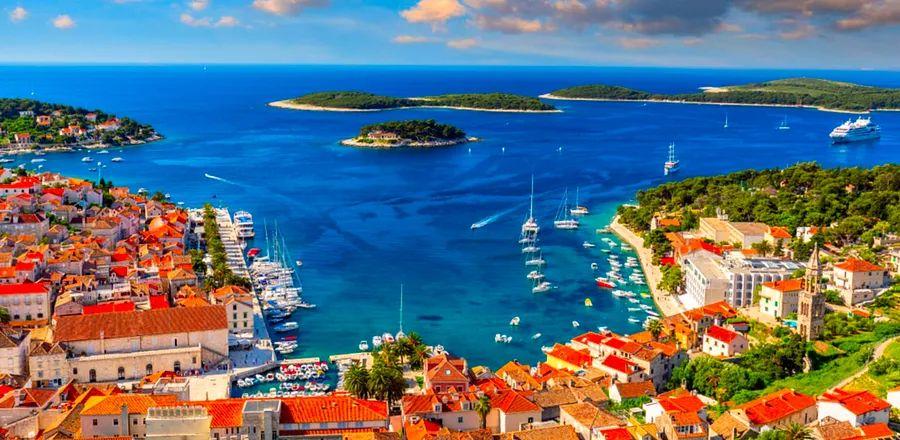Croatia Joins Schengen, Europe’s Borderless Travel Zone

On Thursday, European Union nations reached an agreement to grant Croatia full access to the ID-check-free travel zone of Europe, while Bulgaria and Romania will have to wait longer for their admission.
“The Schengen area is expanding for the first time in over a decade,” tweeted the Czech Republic, which currently holds the EU’s rotating presidency, following a meeting of interior ministers in Brussels. “Ministers approved Croatia’s membership effective January 1, 2023!”
Starting on January 1, travelers will no longer need to present an ID to enter Croatia when arriving from another Schengen country, which encompasses 26 nations—22 EU member states plus Iceland, Liechtenstein, Norway, and Switzerland.
Nearly 1.7 million individuals live in one Schengen nation while working in another, and approximately million people cross an internal border each day.
Austria notably opposed the accession of Bulgaria and Romania, raising concerns about migration issues.
Home Affairs Commissioner Ylva Johansson expressed disappointment to reporters after the announcement, stating, “Our lack of unity regarding Romania and Bulgaria’s accession weakens us and saddens me.”
Johansson emphasized, “You deserve to be full members of Schengen and to enjoy the benefits of free movement within the Schengen area,” noting that both countries had significant backing from nearly all attending ministers.
To achieve full membership, the newest EU members—Bulgaria and Romania, which joined in 2007, and Croatia, which joined in 2013—needed unanimous agreement from their fellow EU members.
Last month, the European Commission, the EU’s executive body, determined that all three candidate nations met the necessary technical criteria for joining, with the European Parliament also supporting their membership bid.
Croatia's application faced no significant opposition from its EU allies, prompting the Zagreb government to celebrate the announcement.
Prime Minister Andrej Plenkovic shared on Facebook that, with the borders now open, Croatia has "achieved the strategic objectives of the government," highlighting that both citizens and the economy will reap the greatest rewards.
“Croatia is officially part of Schengen!” Deputy Prime Minister Davor Božinović exclaimed with joy.
He remarked, “We have removed borders from our European path. We fulfilled all requirements and underwent a long, rigorous process. With Croatia in Schengen, everyone stands to gain—the citizens, the economy, Croatia, and the EU.”
However, prior to Thursday's meeting, Austria seemed poised to block the bids from Bulgaria and Romania due to rising immigration concerns, as more individuals are crossing its borders illegally through the Balkans.
Austrian Interior Minister Gerhard Karner reaffirmed his country's strong opposition, highlighting that over 100,000 individuals have entered Austria this year without authorization.
"The system is currently failing," he stated to the press.
Following the announcement, Marcel Ciolacu, the President of the Romanian Chamber of Deputies, expressed on Facebook that "Austria's unjust resistance is like a free Christmas gift" for Russian President Vladimir Putin.
"Today, European unity and stability suffered a severe blow from a country that has chosen, in challenging times, to forsake its European allies and cater to . . . Russia's interests," Ciolacu remarked. "Austria is evidently out of touch with Europe."
Last week, Dutch Prime Minister Mark Rutte also stirred controversy by claiming that Bulgarian border security personnel could be open to accepting cash bribes.
Bulgarian President Rumen Radev responded sharply, stating on Facebook that three Bulgarian border guards have lost their lives in recent months while safeguarding the EU’s external borders. "Instead of receiving European solidarity," Radev remarked, "Bulgaria is met with cynicism."
To address their partners' apprehensions, Bulgaria and Romania organized two EU fact-finding missions with national experts in recent months to demonstrate the improvements made.
Amnesty International expressed concern over the decisions, citing reports and evidence of unlawful detentions of migrants in several EU nations, particularly Croatia.
Jelena Sesar, Amnesty's Western Balkans Researcher, stated, "Today’s announcement about Croatia’s entry into the Schengen area indicates that the EU not only condones but also rewards these unlawful practices, prioritizing the prevention of entry over human rights."
Evaluation :
5/5



